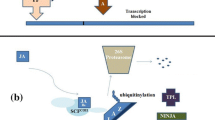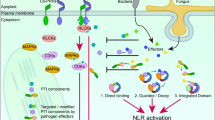Abstract.
Plants successfully use inducible defence mechanisms to combat potential pathogens. Elicitors are signaling compounds that stimulate any of such defence responses. Recent progress in the isolation of pure elicitors has made possible investigations on elicitor-binding proteins which might function as receptors in signal transduction pathways that ultimately activate the defences. The elicitor-binding sites studied so far show a high degree of ligand specificity, as do the candidate binding proteins identified for some of the ligands. Following elicitor perception, a number of rapid reactions are detectable in plant cells, including enhanced ion fluxes across the plasma membrane, formation of reactive oxygen intermediates, changes in protein phosphorylation, and lipid oxidation. Intriguing questions arising from these observations are whether the elicitor-binding proteins constitute receptors in plant defence signaling and whether any of the rapid events participate in signal transduction during defence activation.
Similar content being viewed by others
Author information
Authors and Affiliations
Additional information
Received: 17 November 1997 / Accepted: 22 April 1998
Rights and permissions
About this article
Cite this article
Ebel, J., Mithöfer, A. Early events in the elicitation of plant defence. Planta 206, 335–348 (1998). https://doi.org/10.1007/s004250050409
Issue Date:
DOI: https://doi.org/10.1007/s004250050409




